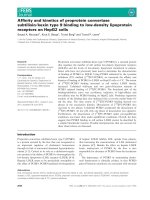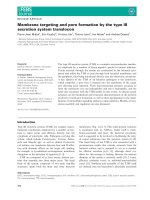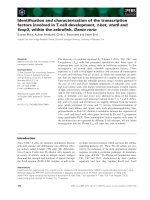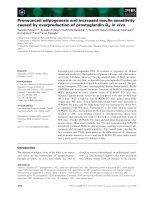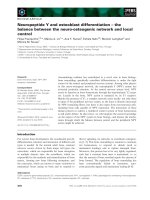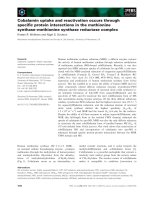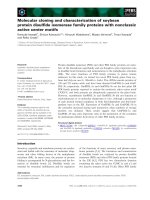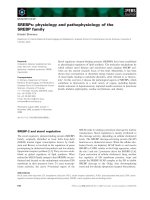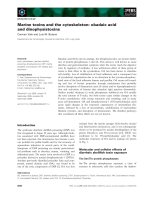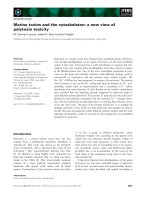báo cáo khoa học: " Globalisation, health and foreign policy: emerging linkages and interests" pdf
Bạn đang xem bản rút gọn của tài liệu. Xem và tải ngay bản đầy đủ của tài liệu tại đây (202.61 KB, 5 trang )
BioMed Central
Page 1 of 5
(page number not for citation purposes)
Globalization and Health
Open Access
Debate
Globalisation, health and foreign policy: emerging linkages and
interests
John Wyn Owen
1
and Olivia Roberts*
2
Address:
1
Former Secretary, The Nuffield Trust, London, UK and
2
Policy Officer, The Nuffield Trust, London, UK
Email: John Wyn Owen - ; Olivia Roberts* -
* Corresponding author
Abstract
A discussion of the growing links between the issues of globalisation, health and foreign policy. This
article examines the effect this has on health, development and foreign policy communities in the
UK and internationally and considers what steps the policy community must take to address the
challenges and opportunities of this new relationship.
Introduction
Professor David Fidler in his Maloy Lecture on 5th Octo-
ber 2004 at Georgetown University said, "The nature and
extent of foreign policy attention devoted to health today
is historically unprecedented" [1]. In his lecture he exam-
ined the nature of this increased attention, specifically
whether "this political revolution reflects a transforma-
tion of foreign policy for the benefit of health, or a trans-
formation of health for the benefit of foreign policy". He
concluded that health does not transform how we think
about foreign policy; rather foreign policy can transform
how we think of health. In this article we examine why
this is so, the effect this has on health, and what steps the
policy community must take to address the challenges
and opportunities of this new relationship.
Globalisation, health and foreign policy are themes that
the Nuffield Trust has been analysing for a number of
years, in association with its international partners. Glo-
balisation can, at its core, be defined as a process of
change affecting the nature of human interaction as
boundaries become eroded across a range of spheres and
along three dimensions: spatial, temporal and cognitive
[2]. The rationale for engaging on this issue is based on
three main developments.
• There are growing links between health policy and secu-
rity and foreign policy, with developments in these fields
having many implications for health, both in the United
Kingdom and globally.
• Secondly, increasing globalisation has blurred the
boundaries between domestic and foreign agendas, and
the way we think and act in relation to health policy must
adapt accordingly.
• Finally, links between health, foreign policy and security
policy and development are increasingly been made, rein-
forcing the need to fully appreciate the place of health in
the policy agenda.
Health has always been an issue in foreign policy but as its
prominence increases, it is important to assess whether it
is appropriately prioritised and how the government
interacts with business and civil society on a national,
regional (e.g. EU) and global basis. The HIV/AIDS pan-
demic, SARS, efforts to improve preparedness for bioter-
Published: 29 July 2005
Globalization and Health 2005, 1:12 doi:10.1186/1744-8603-1-12
Received: 27 November 2004
Accepted: 29 July 2005
This article is available from: />© 2005 Owen and Roberts; licensee BioMed Central Ltd.
This is an Open Access article distributed under the terms of the Creative Commons Attribution License ( />),
which permits unrestricted use, distribution, and reproduction in any medium, provided the original work is properly cited.
Globalization and Health 2005, 1:12 />Page 2 of 5
(page number not for citation purposes)
rorism, and the Framework Convention on Tobacco
Control all provide recent examples where health con-
cerns mix with high politics. SARS highlighted the neces-
sity of global co-ordination of efforts to control
communicable disease and the importance of urgent
review and effective reform of the system of international
health regulations. Since the events of 11th September
2001 the health and development agenda has also been
widely linked with the foreign policy priorities of improv-
ing global security and preventing state failure. Bioterror-
ism has formed a prominent part of the health and
security agenda. These examples illustrate how health has
become a foreign policy and security issue for a range of
actors both inside and outside government: there has
been recognition that new and existing problems necessi-
tate new responses and a scaling up of efforts. As a result,
policy-makers in the previously rather distant fields of
health, security and foreign policy must consider each
other's work as they are confronted by the interplay of
issues at the global level.
However, there are considerable differences between
countries in their attitudes to the relationship between
health and foreign policy. The 2002 Canadian Commis-
sion on future health care stated that access to health care
is not only a domestic policy priority but also a key objec-
tive for foreign policy as well, and the promotion of
human rights, including the right to health, is a funda-
mental principle of Canadian foreign policy [3]. In con-
trast, US foreign policy is shaped by the domestic political
agenda with schemes such as PEPFAR heavily influenced
by the present administration's value judgements, and less
likely to be part of a co-ordinated approach with other
countries [4]. The conditionalities that US foreign policy
attitudes place on global health policy, such as the domi-
nance of abstinence-based programmes in US AIDS fund-
ing [5], can restrict global health solutions and ultimately
undermine the achievement of global health equity.
Health and Security
The current inclusion in policy discussions of issues
beyond national borders highlights the increasing debate
about the implications of globalisation for health. While
globalisation has perhaps become an over-familiar term it
encompasses issues of enduring and profound signifi-
cance: the opening of economies, increasing flows across
borders, and increasing interdependence between people
and places. As a result the distinction between domestic
and foreign spheres is becoming more blurred. Inge Kaul,
Director of Studies for the UNDP programme on global
public goods, noted that the increase of problems in the
global arena requires a more global perspective on foreign
affairs in national policies and within those departments
dealing with foreign affairs [6]. As Peter Hain, a UK Gov-
ernment Minister, wrote in his book 'The End of Foreign
Policy', 'there is no longer such a place as abroad' [7].
These developments have many implications for health,
presenting both risks and opportunities. Whilst states
have sought to retain sovereignty over health care and
health policy, the determinants of health often lies with
global forces. The challenge is to maximise the benefits
and minimise the harm of globalisation, keeping the
questions of human rights and equity firmly in view. On
the one hand states are forced to co-operate to solve their
problems: this applies to health, peace, the environment
and knowledge. On the other hand there is a trend
towards subsidiarity or the principle of devolving power
of decision-making to the lowest possible levels. Many
areas of public policy that were considered to be national
now spill across borders and are global in reach and
impact. Foreign policy makers must therefore broaden
their horizons when devising policies aimed at national
interests.
Inevitably, when thinking of foreign policy, the issue of
security and the protection of national interests are con-
sidered. Crucial policy goals, such as human security, are
being reshaped in light of this global influence and issues
such as health play a central part in making globalisation
work. It is also an area of shared mutual concern that
offers an opportunity to address some of the world's
pressing problems. Providing health services and
responding to health crises in regions experiencing or
emerging from conflict is one of the most difficult chal-
lenges faced by national health systems, international
organisations and humanitarian agencies. Conflict adds
to the burdens faced by the health systems in many coun-
tries, creating additional need and diverting resources
from other health priorities. Improved health systems can
play a role in nation-building and reinforcing democratic
principles. Within these contexts, health can be viewed as
a core goal of socio-economic development efforts. A
human security approach to health development offers a
broadened and, arguably, more meaningful conception of
security itself. However, there is a risk that health develop-
ment may become linked to a narrower security agenda,
which has a traditional focus on the national interests of
the powerful, and on military intervention. It is therefore
important that if healthcare is to act as a 'bridge to peace',
as recognised by the WHO in their 2000 'Peace through
health' initiative, the aims of one policy area are not sacri-
ficed for the benefit of another [8].
Health and Trade
Global trade rules, and in particular Trade-Related Aspects
of Intellectual Property Rights (TRIPS), which form a cen-
tral element of economic globalisation, have profound
implications for health. There are five multilateral agree-
Globalization and Health 2005, 1:12 />Page 3 of 5
(page number not for citation purposes)
ments on trade under the World Trade Organisation that
are relevant for health. The General Agreement on Tariffs
and Trade (GATT) allows countries under certain condi-
tions to ban the import of products if necessary to protect
public health. However, the protection of patent owner-
ship within this Agreement can promote intellectual prop-
erty above public health. The Agreement on the
Application of Sanitary and Phytosanitary Measures (SPS)
affects national policies for food safety, and runs the risk
health and safety regulations being used as an excuse for
protecting domestic producers. The Agreement on Techni-
cal Barriers to Trade (TBT) may have implications for the
adoption of health and safety regulations, if they add to
production costs. The General Agreement on Trade in
Services (GATS) extends the concept of cross-border trade
to include, for example investments in the hospital sector,
thus potentially opening up health systems to privatisa-
tion. Finally, the TRIPS Agreement, though intended to
strengthen the incentives to create new knowledge, made
patented drugs more expensive and restricted the ability
of poorer countries to obtain medicines by prohibiting
access to the cheaper generic drugs. This was despite con-
taining a measure to allow countries to manufacture drugs
locally under conditions of a public health emergency.
The complexity of these rules means that to ensure the
protection and promotion of health interests, countries
need to combine considerable expertise in economics and
law, whilst interacting with other nations and multina-
tionals in ways that they may not be experienced. Where
countries have side-stepped the trade agreements in the
interests of public health, the outcome has been legal
reprisals by patent owners through the conduit of interna-
tional agreements [9]. As stated in the 2002 Commission
on the Future of Health in Canada, there is profound con-
cern about the potential for trade agreements to unduly
constrain future policy options and it is important for
WTO members to ensure that efforts to liberalize trade do
not override social policy objectives such as global health
equity [10].
While aid funding and technical expertise are essential,
professional and community links are also vital to sup-
port global health – policies for global health cannot be
determined by governments alone. An assessment of Aus-
tralia's development programme in 2002 concluded that
foreign investment is four times greater than direct aid,
and is more likely to have a major impact on health [11].
This highlights a need for cross-sectoral dialogue and co-
operation in both developed and developing countries,
which is one of the defining features of health as a foreign
policy issue. The prospects for global health, the health of
the poorest in particular, are bound up with the need for
reform of trade tariffs and domestic subsidies, debt relief
and aid flows. This is not a one-way relationship, how-
ever, or purely a developing world phenomenon. The dis-
rupting effects of health problems, particularly acute
infectious diseases, on trade and the economic and social
repercussions are well-known, and were recently demon-
strated in the SARS outbreak [12].
Given this relationship, we need a better understanding of
globalisation in order to make it work better for health.
Globalisation badly managed could contribute to worsen-
ing health and health inequalities, if a substantial number
of people are marginalised and disadvantaged by the
process. On the other hand we could make globalisation
work to the advantage of all, rich or poor. This is a hard
challenge but a moral imperative of the first order, as the
Prime Minister of the United Kingdom stated in the DFID
White Paper on Making Globalisation Work to Eliminate
World Poverty [13].
Health and Development
Health has long been recognised as a central feature of
development and was acknowledged as an important ele-
ment of preserving international peace and security after
World War 2. The Commission on Human Security
reported that deterioration in health in large parts of the
developing world has occurred at a time of major
advances in medical research and development in richer
countries, particularly in epidemiology and basic biomed-
ical sciences [14]. And as a recent report by UNAIDS
shows, the challenge for health and development also lies
in shaping the political, economic and social order [15].
The closely related problems of poverty and ill-health
have been the subject of a number of global initiatives
since the late 1990s. Many governments have signed up to
the UN Millennium Development Goals but not all have
incorporated them into their policy frameworks. Pledges
on funding for health have been made at summits of the
G8 countries, initiatives such as Global Fund and the new
partnership of African development have generated some
resources and the US has pledged additional money.
However, further endeavour is needed to secure consen-
sus, coordinate efforts, and practically deliver on commit-
ments and to consolidate health as an enduring
international priority.
This is still one of the main challenges in global health:
moving beyond welcome but insufficient increases in
dedicated resources towards clear commitments aimed at
solving the problems we face. There are also dangers in
associating health with narrow foreign policy goals and
conditionalities that may in fact undermine health, such
as user fees on primary health care and education. What is
needed is a broad and integrated view of health and its
determinants, its linkage to foreign policy, and support
and opportunities for countries to articulate both their
own needs and agree common positions. If this agenda
Globalization and Health 2005, 1:12 />Page 4 of 5
(page number not for citation purposes)
becomes a top-down enterprise formulated by G8 coun-
tries and then sold to the rest of the world, it is likely to
fail. SARS has shown the limits of current approaches to
health challenges and lessons must still be learnt and re-
learnt in order to deal with the threatened AIDS epidemics
in Russia, China and India. SARS served to clearly demon-
strate the key requirements of robust health policy that are
required to enable a state to be 'resilient' to health chal-
lenges. These are: ability to assess potential health chal-
lenges; prevention as part of the policy mind-set;
preparation; capacity to respond; and ability to rapidly
recover. To succeed also requires the involvement and
consent of empowered civil society. The problem is global
and international but much of the solution must be local
and social. The promotion of global health can be a posi-
tive form of engagement within the global community
due to health's status as a 'global public good', a universal
right for all. By focusing on global equity, policies can be
viewed as alleviating some of the negative aspects of glo-
balisation and the promotion of health and robust health
systems can make a crucial contribution to both human
development and global security. Health improvement
or, in some countries, the prevention of further decline, is
not only important for humanitarian reasons but is essen-
tial for social and economic development.
There are also clear and close correlations between pov-
erty, environmental hazards and ill health. A key issue is
urbanisation, with the world becoming more urban, spe-
cifically in developing countries. The growth in many
mega-cities is not well regulated and is environmentally
hazardous, with huge gaps in social services and infra-
structure. The United Nations has recently scaled up its
habitat programme and under the US Administration,
USAid brought some focus to urbanisation but the effort
is still under-resourced. The distinction between states
and the cities within those states is crucial: foreign policy
traditionally looked at the world as composed of states
but it is now urban centres that connect the world,
through the process of globalisation. To understand glo-
bal health challenges we must keep in view the world of
cities and the importance of urban public health.
Governance
Global governance for health continues to evolve and
become more complex and challenging, involving multi-
ple actors and changing ideas of sovereignty. There is a
need for integrated thinking, bringing health together
effectively with other policy areas in the context of globali-
sation. We must continue to ask how appropriate current
global, regional and sub-regional arrangements are for
dealing with new and existing global challenges. In Sep-
tember 2003 Kofi Annan, Secretary-General of the United
Nations, said, "We have come to a fork in the road. This
may be a moment no less decisive than 1945 when the
United Nations was founded" [16]. The UN was a divided
organisation, with countries disagreeing about the war in
Iraq and how best to respond to threats to their collective
future, varying from weapons of mass destruction to HIV/
AIDS and global warming. Left unattended, these prob-
lems reinforce each other. Disregard for a failing state
today may contribute to the emergence of bastion of ter-
rorism tomorrow. Afghanistan showed us that economic
issues and health could undermine our ability to respond
to conflict, with Afghanistan ranking at or near the bot-
tom of every socio-economic indicator used to measure
human and economic progress [17]. 23 years of conflict
and the economic degradation associated with conflict
decimated infrastructure, causing the decline of preven-
tive healthcare, the unavailability of treatment facilities
and drugs, and the lack of appropriately trained health
care personnel.
Nowhere more so than in Africa does governance and
health form a unique challenge. It is predicted that in ten
years' time HIV/AIDS will have reduced significantly the
capability of the South African Defence Force, undermin-
ing its ability to be an effective peacekeeper in the region
[18]. This is one illustration of why a mature discussion is
needed on globalisation, health and foreign policy mat-
ters, including the promotion of resilience, capability and
leadership and co-ordination on global public health pol-
icy. A reformed United Nations is crucial to delivering this
goal. Firstly, reform of the UN should aim not only to pre-
vent conflict but when conflict has ended, to take action
to develop institutions and build an enduring peace. Sec-
ondly, there is a role for the UN in developing agreements
which provide necessary resources to efficiently achieve
the Millennium Development Goals, focusing on what
countries need to tackle poverty and to create better health
care systems. Finally, there is a need for stronger interna-
tional regimes to counter today's threats of poverty, dis-
ease, climate change and provide greater security from
terrorism and weapons of mass destruction via tighter
nuclear, biological and chemical controls and reinforced
co-operation on counter-terrorism.
The political will of countries will be crucial and the
health communities can contribute to raising awareness
and engaging with the policy community to promote
action. As medical students wrote in The Lancet on 3
November 2001:
For many the true meaning of globalisation hit home
acutely after the terrorist attacks in the United States on
11th September. The health sector too is profoundly
affected by changing global processes, from the horror of
the HIV/AIDS pandemic to the increasing rates of refugees
and migrants: from the controversy over global pharma-
ceutical patents to the health implications of the World
Globalization and Health 2005, 1:12 />Page 5 of 5
(page number not for citation purposes)
Trade Organisation. The issues of the day all affect the
work of a doctor. It is not no longer enough for medical
curricula to teach about national medicine: our new doc-
tors want and need more" [19].
In the case of the European Union, one suggested solution
is an EU Global Health Strategy. At national or regional
levels, the development of 'pathfinders' through research
and consultation processes could provide a framework for
future global health strategies. Such documents would
encompass key elements and messages, incorporating
important trends and issues in global health and taking a
systematic and focused perspective on a nation's capabili-
ties in global health. It could also highlight key principles
policy formulation, specifically the ability to consider and
appropriately balance the differing objectives and mecha-
nisms within foreign affairs, trade, health, finance and
home affairs.
In summary, the challenge is how to make globalisation
work for health and to use health to foster better forms of
globalisation. Implicit in the idea of making globalisation
work is the contention that it is not working at the
moment. Some may argue that this is not the case: global
life expectancy continues to rise, the global economy
expands, and scientific innovation and discovery proceed
at seemingly exponential rates, unlocking the keys to
increased health, wealth and happiness. However, we are
aware, as never before, of the downside of our increasing
interconnectedness and while large parts of the globe
experience the positive story of globalisation, millions are
cut off from it. Less than 10% of health research is directed
towards the major health problems that affect 90% of the
world's population. These failings must be addressed, not
just for reasons of common humanity but for the funda-
mental reason that the negative externalities of economic
globalisation may in time threaten its very foundations.
Health has a central role to play in meeting the challenge
of making globalisation work. The danger is that we will
have health as a private good, health as exclusive and hier-
archical, health as the preserve of only the rich, and health
as a matter only of national security. This challenge is not
just about technology, neither is it just about supply and
demand, getting markets right, although both will play a
role. The Nuffield Trust recognises the importance of
extending the appreciation of health issues amongst pol-
icy-makers, and has been working on initiatives to bring
together diverse members of policy to discuss global chal-
lenges. However, it is not just a matter for politicians,
although they must of course play their part. This is fun-
damentally a challenge to our ability to act together at all
levels that affect and are affected by these issues: the places
we live; political communities and nations; across differ-
ent countries; and in institutions of global governance. By
mobilising the key actors we can begin to fulfil the prom-
ise of 'health as a bridge for peace' and reap the global
benefits that this will bring.
References
1. Fidler D: Health as Foreign Power: Between Principle and
Power. 2004 [ />]. Maloy Lecture,
Georgetown University October 5 2004
2. Lee K: Globalization and health: an introduction. Palgrave Mac-
Millan: London; 2003.
3. Romanow R: Building on Values: The Future of Health Care in
Canada. 2002:240 [ />pdfs/HCC_Final_]. Commission on the Future of Health Care in Can-
ada
4. Ollila E: Global health priorities – priorities of the wealthy?
2005 [ />]. Glo-
balization and Health: London
5. Cohen J, Schleifer R, Tate T: AIDS in Uganda: the human-right
dimension. The Lancet: London 2005, 365(9477):. 18–21 June 2005
6. Kaul I, Conceição P, Le Goulven K, Mendoza RU: Why do Global
Public Goods Matter Today? Providing Global Public Goods: Manag-
ing Globalization, United Nations Development Programme 2003 [http://
www.undp.org/globalpublicgoods/globalization/pdfs/Overviews.pdf].
Oxford University Press (USA): New York
7. Hain P: The End of Foreign Policy? Global Interests, global
linkages and natural limits. Green Alliance Publications: London;
2001.
8. Hess G, Pfeiffer M: Comparative analysis of WHO "Health as a
Bridge for Peace" case studies. 2000 [ />techguidance/hbp/comparative_analysis/en/index.html]. World
Health Organisation
9. BBC News: Drugs case victory for South Africa. 2001 [http://
news.bbc.co.uk/1/hi/world/africa/1283075.stm].
10. Romanow R: Building on Values: The Future of Health Care in
Canada. 2002:241 [ />pdfs/HCC_Final_Report]. Commission on the Future of Health Care
in Canada
11. Commonwealth of Australia: Australia's Overseas Aid Program
2002–03. 2002 [ />budget_ministerial/AusAid/html/ausaid_index.html].
12. BBC News: Fears spread over deadly virus. 2003 [http://
news.bbc.co.uk/1/hi/world/asia-pacific/2858439.stm].
13. DFID: Making Globalisation Work to Eliminate World Pov-
erty. The Stationery Office: London 2000 [ />files/whitepaper2000.pdf].
14. Commission on Human Security: Human Security Now. 2003
[ />]. Commis-
sion on Human Security: New York
15. UNAIDS: AIDS Epidemic Update 2004. Joint United Nations Pro-
gramme on HIV/AIDS (UNAIDS) and World Health Organization (WHO),
UNAIDS: Geneva 2004.
16. United Nations: The Secretary General's Address to the Gen-
eral Assembly. New York 2003 [ />statements/sg2eng030923]. 23 September 2003
17. USAID: Congressional Budget Justification – FY 2005. 2005
[ />].
18. BBC News: South Africa's army 'unfit'. 2002 [http://
news.bbc.co.uk/1/hi/world/africa/2129563.stm].
19. Lancet: Educating doctors for world health. Lancet: London 2001,
358(9292):. 3 November 2001
